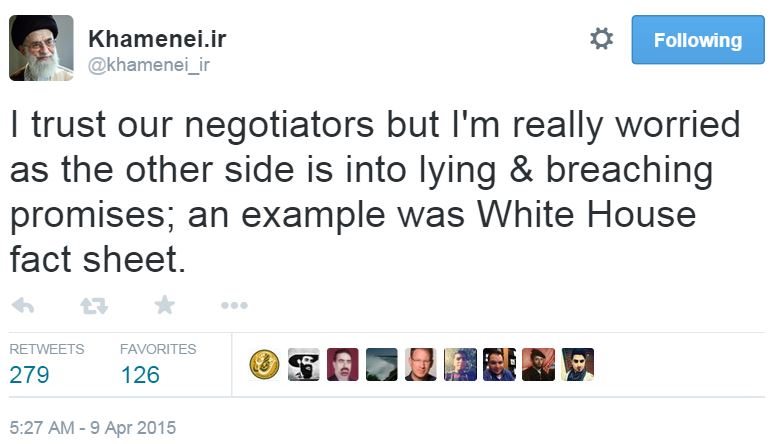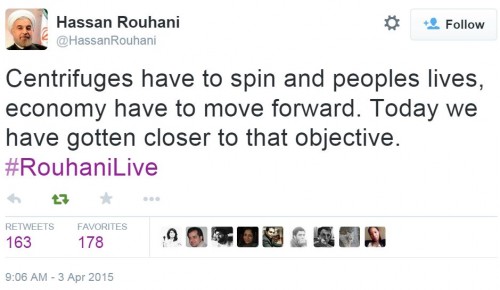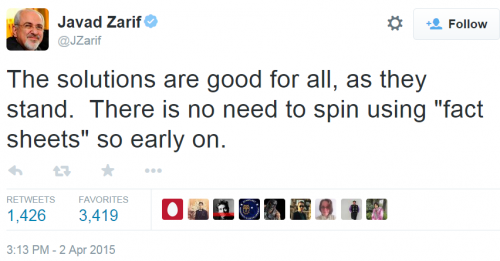Iran Supreme Ayatollah: White House lying about nuke deal


Cooperation is not an exercise in good feeling; it presupposes congruent definitions of stability. There exists no current evidence that Iran and the U.S. are remotely near such an understanding. Even while combating common enemies, such as ISIS, Iran has declined to embrace common objectives. Iran’s representatives (including its Supreme Leader) continue to profess a revolutionary anti-Western concept of international order; domestically, some senior Iranians describe nuclear negotiations as a form of jihad by other means.In sum, the op-ed eloquently observes the Iran deal is a complete and total cluster. At a press conference held earlier today, Marie Harf was in no mood to discuss the WSJ lashing. Flustered, Harf attempted to avoid questions on the WSJ op-ed, but Associated Press reporter Matt Lee persisted. "I read it and it's far from nuanced. It's pretty damning," Lee says. "You just reject it outright? They say this is a recipe for disaster basically, but you say, no, clearly, you wouldn't be pursuing something you thought was a recipe for disaster. Is that correct?" Lee reads a few lines of the piece, and lobs them back to Harf.
Defending an emerging nuclear deal, President Barack Obama said Iran would be kept a year away from obtaining a nuclear weapon for more than a decade, but conceded Tuesday that the buffer period could shrink to almost nothing after 13 or more years. Obama, whose top priority at the moment is to sell the framework deal to critics, was pushing back on the charge that the deal fails to eliminate the risk because it allows Iran to keep enriching uranium. He told NPR News that Iran will be capped for a decade at 300 kilograms — not enough to convert to a stockpile of weapons-grade material. "What is a more relevant fear would be that in Year 13, 14, 15, they have advanced centrifuges that enrich uranium fairly rapidly, and at that point, the breakout times would have shrunk almost down to zero," Obama said.It's not at all clear that 13 years is the correct number, as opposed to 10. But regardless, the point is that at the end of this process Iran is ready to produce a bomb. Where have I heard that before? Oh yeah, Netanyahu: Nuke Deal 'Paves Iran's Path to the Bomb':

 Since then, the divergence has grown, The Times of Israel reports:
Since then, the divergence has grown, The Times of Israel reports:
 As The Washington Post editorial board points out, these parameters are contrary to the bottom line Obama spelled out at the start of the negotiations:
THE “KEY parameters” for an agreement on Iran’s nuclear program released Thursday fall well short of the goals originally set by the Obama administration. None of Iran’s nuclear facilities — including the Fordow center buried under a mountain — will be closed. Not one of the country’s 19,000 centrifuges will be dismantled. Tehran’s existing stockpile of enriched uranium will be “reduced” but not necessarily shipped out of the country. In effect, Iran’s nuclear infrastructure will remain intact, though some of it will be mothballed for 10 years. When the accord lapses, the Islamic republic will instantly become a threshold nuclear state.
That’s a long way from the standard set by President Obama in 2012 when he declared that “the deal we’ll accept” with Iran “is that they end their nuclear program” and “abide by the U.N. resolutions that have been in place.” Those resolutions call for Iran to suspend the enrichment of uranium. Instead, under the agreement announced Thursday, enrichment will continue with 5,000 centrifuges for a decade, and all restraints on it will end in 15 years.
How did Iran do it?
By setting its own negotiating red line and refusing to budge.
I've seen that negotiating tactic hundreds of time -- it's effective only when the opposing party is not willing to walk away from the negotiation.
That's us.
Obama so desperately wanted a deal that he was not willing to walk away. The Iranians didn't need to walk away, they just needed to dig in behind their red line and wait.
So Obama capitulated on the key insistance of Iran keeping it's nuclear program intact, and then negotiated over the rest. Obama admitted as much in his speech after the Framework was announced:
As The Washington Post editorial board points out, these parameters are contrary to the bottom line Obama spelled out at the start of the negotiations:
THE “KEY parameters” for an agreement on Iran’s nuclear program released Thursday fall well short of the goals originally set by the Obama administration. None of Iran’s nuclear facilities — including the Fordow center buried under a mountain — will be closed. Not one of the country’s 19,000 centrifuges will be dismantled. Tehran’s existing stockpile of enriched uranium will be “reduced” but not necessarily shipped out of the country. In effect, Iran’s nuclear infrastructure will remain intact, though some of it will be mothballed for 10 years. When the accord lapses, the Islamic republic will instantly become a threshold nuclear state.
That’s a long way from the standard set by President Obama in 2012 when he declared that “the deal we’ll accept” with Iran “is that they end their nuclear program” and “abide by the U.N. resolutions that have been in place.” Those resolutions call for Iran to suspend the enrichment of uranium. Instead, under the agreement announced Thursday, enrichment will continue with 5,000 centrifuges for a decade, and all restraints on it will end in 15 years.
How did Iran do it?
By setting its own negotiating red line and refusing to budge.
I've seen that negotiating tactic hundreds of time -- it's effective only when the opposing party is not willing to walk away from the negotiation.
That's us.
Obama so desperately wanted a deal that he was not willing to walk away. The Iranians didn't need to walk away, they just needed to dig in behind their red line and wait.
So Obama capitulated on the key insistance of Iran keeping it's nuclear program intact, and then negotiated over the rest. Obama admitted as much in his speech after the Framework was announced:
THE “KEY parameters” for an agreement on Iran’s nuclear program released Thursday fall well short of the goals originally set by the Obama administration. None of Iran’s nuclear facilities — including the Fordow center buried under a mountain — will be closed. Not one of the country’s 19,000 centrifuges will be dismantled. Tehran’s existing stockpile of enriched uranium will be “reduced” but not necessarily shipped out of the country. In effect, Iran’s nuclear infrastructure will remain intact, though some of it will be mothballed for 10 years. When the accord lapses, the Islamic republic will instantly become a threshold nuclear state. That’s a long way from the standard set by President Obama in 2012 when he declared that “the deal we’ll accept” with Iran “is that they end their nuclear program” and “abide by the U.N. resolutions that have been in place.” Those resolutions call for Iran to suspend the enrichment of uranium. Instead, under the agreement announced Thursday, enrichment will continue with 5,000 centrifuges for a decade, and all restraints on it will end in 15 years.In his speech after the announcement, Obama took care not only to repeat the false rhetorical device of the only choice being between this deal and war, he blamed that choice on Israeli Prime Minister Benjamin Netanyahu. David Horvitz at The Times of Israel writes, Defeatist Obama’s deal with the devil:
Zarif: “We will continue enriching. We will continue research and development. Our heavy water reactor will be modernized.”
— Rosie Gray (@RosieGray) April 2, 2015Zarif says Iran has agreed to take steps "for a period of time," which seems to confirm sunset clause…big Western concession.
— Guy Benson (@guypbenson) April 2, 2015#BREAKING #IranDeal for 10 yrs; 5000+ centrifuges continue 3.67 enrichment in Natanz.
#IranTalks #Lausanne
— Mehr News Agency (@MehrnewsCom) April 2, 2015They had set a deadline of Tuesday for a framework agreement, and later softened that wording to a framework understanding, between Iran and the so-called P5+1 nations — the United States, Britain, France, Germany, Russia and China. After intense negotiations, obstacles remained on uranium enrichment, where stockpiles of enriched uranium should be stored, limits on Iran's nuclear research and development and the timing and scope of sanctions relief among other issues. The aim has been a joint statement is to be accompanied by additional documents that outline more detailed understandings, allowing the sides to claim enough progress has been made to merit a new round, officials said. Iran has not yet signed off on the documents, one official said, meaning any understanding remains unclear. ...The softening of the language from a framework "agreement" to a framework "understanding" appeared due in part to opposition to a two-stage agreement from Iran's supreme leader, Ayatollah Ali Khamenei. Earlier this year, he demanded only one deal that nails down specifics and does not permit the other side to "make things difficult" by giving it wiggle room on interpretations.Any deal reached would only amount to a soft framework, and likely not be particularized in writing as we reported Friday.
As night fell, intense explosions could be heard throughout the rebel-held capital Sanaa, where warplanes had carried out strikes since the early morning. Military officials from both sides of the conflict said that airstrikes were targeting areas east and south of the third largest city of Taiz, as well as its airport, while naval artillery and airstrikes hit coastal areas east of Aden. "It's like an earthquake," Sanaa resident Ammar Ahmed said by telephone. "Never in my life have I heard such explosions or heard such raids."
Iran and six major powers were exploring possible compromises to break an impasse in nuclear negotiations on Sunday, but officials cautioned they were unable to move on several sticking points. The news came as Israel said the details of a possible agreement emerging from talks in Lausanne, Switzerland were worse than it feared. In a significant development in talks aimed at securing a preliminary nuclear deal, several officials told Reuters Tehran had indicated a willingness to accept fewer than 6,000 nuclear centrifuges and to send most of its enriched uranium stockpiles for storage in Russia. Western powers, on the other hand, were considering the idea of allowing Iran to conduct limited, closely-monitored enrichment-related work for medical purposes at an underground facility called Fordow, the officials added on condition of anonymity. Iran had originally insisted on keeping in operation the nearly 10,000 centrifuges it currently uses, but said in November that Washington indicated it could accept around 6,000. Iranian officials say they had been pushing for 6,500-7,000. The officials said all parts of an emerging nuclear deal were interrelated. "Everything could still fall apart," a Western official told Reuters, adding that the talks could drag on to Tuesday, the self-imposed deadline for a framework agreement.According to The Telegraph, a pro-Rouhani Iranian journalist covering the P5 + 1 talks has sought asylum in Switzerland following frustration that he "could only write what he is told":
Richard Engel: Military Officials Say Allies No Longer Trust Us, Fear Intel Might Leak to Iran NBC’s Richard Engel reported Friday that U.S. officials were stunned they were not given any notice before Saudi Arabia launched attacks against Houthi rebels. According to Engel, military leaders were finding out about the developments on the Yemen border in real time. Engel said officials from both the military and members of Congress believe they were not given advanced warning because the Arab nations do not trust the Obama administration after they befriended Iran. “Saudi Arabia and other countries simply don’t trust the United States any more, don’t trust this administration, think the administration is working to befriend Iran to try to make a deal in Switzerland, and therefore didn’t feel the intelligence frankly would be secure. And I think that’s a situation that is quite troubling for U.S. foreign policy,” Engel said.Watch the segment: Ed Morrissey of Hot Air commented:
Engel’s report strongly suggests that it’s not just incompetence that has the Saudis and other US allies rattled, but a suspicion that they’re being purposefully sold out by Obama to get a deal with Iran that will unleash their ambitions to dominate the region.
Namely, my appearance on the Larry O'Connor Show....
 A vague deal that won't even appear in writing. At least according to British Foreign Secretary Philip Hammond.
Edward-Isaac Dovere reports at Politico:
A vague deal that won't even appear in writing. At least according to British Foreign Secretary Philip Hammond.
Edward-Isaac Dovere reports at Politico:
No specifics, nothing written, perhaps not even anything that Iran and the international negotiating partners say as one—that’s the most to expect out of the nuclear talks now running up against the deadline in Switzerland, British Foreign Secretary Philip Hammond said Friday. But even concluding this round of talks with that level of ambiguity, Hammond said, would count as a significant success. And he thinks they’ll get it.It's safe to say that Secretary Hammond's definition of success is a bit different from the rest of the world.
With shrewd strategic perspective, the Iranian leadership has weighed the long term implications of an agreement with the major powers that constitutes international recognition of Iran’s “right” to be a “nuclear threshold state,” and gives it the ability to break out to a nuclear bomb when it so chooses. Consequently, it seeks an agreement (even if its validity is limited to 10-15 years) that in addition to leaving it with access to its nuclear technology also rewards it with both removal of the sanctions and international recognition of its special status in the Middle East. The status of a threshold state will leave Iran with the possibility of arming itself with nuclear weapons within a short time span, when it decides that conditions enable (or in its view, require) it to break out to military nuclear capability.Who will act against it at that time when Iran decides the time is right for the breakout?
Wall Street Journal reports: The back story emerges -- Obama hid negotiations and details, from Israel and Congress....
Diplomats say the French foreign minister, Laurent Fabius, telephoned the French delegation in Lausanne to ensure it did not make further concessions, and to insist that the bulk of UN sanctions could only be lifted if Iran gave a full explanation of evidence suggesting it may have done development work on nuclear warhead design in the past. ... The US offer on sanctions is to lift UN sanctions in layers in return each “irreversible” step Iran makes to scale down and limit its nuclear programme. There would be mechanisms in place by which sanctions would “spring back” if Iran violated the agreement, without the need for consensus in the UN security council. It is broadly supported by the UK and Germany, while Russia and China, the other members of the six-nation group, would offer more generous terms. Tehran is reluctant to accept sanctions relief based on milestones, but diplomats say the French position would be a complete deal-breaker. They say the Iranians would be very unlikely to admit past weapons work, which if revealed would demonstrate that the country’s supreme leader, Ali Khamenei, had misled the world. Better, US diplomats argue, to focus on limiting the current Iranian programme and worry about allegations about the past a few years down the road.Focus on the current issues and leave the allegations for the future? Are they crazy? Let's take a couple of paragraphs from United Nations Security Council Resolution 1696, which was passed in July 2006 and was the first of six resolutions passed against Iran for its violations of the Nuclear Nonproliferation treaty.
Regardless of what Secretary Kerry tells the Associated Press, Ayatollah Seyed Ali Khamenei, Iran's Supreme Leader is not exactly a fan of Obama, America, or any deal that doesn't remove sanctions. And if you need more proof, look no further than than the Ayatollah's Twitter feed.Take a minute to scroll through @khamenei_ir’s twitter feed today. Further proof Iran is not a rational, peaceful actor. #IranTalks
— Tom Cotton (@SenTomCotton) March 21, 2015
#Obama says in his #Nowruz message:submit to what we dictate so that your economic activity boosts! This is an arrogant viewpoint.#Irantalks
— Khamenei.ir (@khamenei_ir) March 21, 2015
#Sanctions are enemy's only means for putting pressure on ppl.Prudence will nullify sanctions showing that we have to rely on ourselves.
— Khamenei.ir (@khamenei_ir) March 21, 2015Donations tax deductible
to the full extent allowed by law.
Founder
Sr. Contrib Editor
Contrib Editor
Weekend Editor
Higher Ed
Author
Author
Author
Author
Author
Editor Emerita
